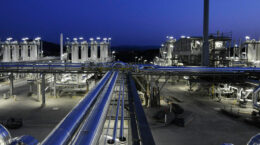
"Our battery materials complements BASF‘s overall product portfolio delivering solutions to our customers from the automotive industry. While battery electric vehicles have the benefit of zero emission mobility, the battery itself and its raw material value chain require an energy intensive production process. BASF can help keep the carbon footprint of the value chain for electromobility as low as possible. Our cathode active materials will have an industry leading low CO₂ impact thanks to our efficient manufacturing process, the high share of renewable energy, the upstream integration into the key raw materials like Cobalt and Nickel, as well as the short transportation route along the value chain.”
Dr. Peter Schuhmacher, President, Catalysts Division at BASF
"We strongly believe that electromobility should be based on batteries that are produced with the highest possible social and environmental standards. BASF is contributing with lowest-CO₂ cathode active material solutions to relentlessly strive for a unique, reliable and sustainable battery value chain. We practice sustainable raw materials sourcing and leverage recycling solutions without compromising performance and cost competitiveness.”
Dr. Michael Baier, Senior Vice President of Battery Materials, Catalysts Division at BASF

Reduced CO2 footprint of our European value chain
As a leading chemical company, we are committed to reduce our absolute CO2 emissions by 25% by 2030 and aim to achieve CO2 neutral growth by 2050. We are determined to provide innovative high-performance products with a minimized CO2 footprint along the battery value chain.
- Effectively research and develop cathode active materials with a higher energy density leading to less materials consumption for batteries and enabling a longer driving range of cars
- Implement innovative calcination technologies
- Leading production technologies for reaction steps
In Europe, our recent investments will enable us with:
- Efficiency gains through a concentrated value chain combining base metal supply, particularly nickel and cobalt, precursor production, and cathode material production within one region.
- An industry leading energy mix and closed-loop recycling will allow for lower CO2 footprint compared to the average industry standard.
- Short and reliable access to products in proximity to customers’ European manufacturing facilities will reduce the energy consumption during transportation


Visualisation of the future plant for cathode active materials in Schwarzheide, Germany.
Our new plant in Schwarzheide will use an energy-efficient gas and steam turbine power plant that operates on the principle of combined heat and power generation. It is currently being modernized to further increase its eco-efficiency. Further integration of renewable energies is also planned. The Harjavalta plant will use 100% locally generated renewable electrical energy resources, including hydro, wind and biomass-based power.
Through regional production in combination with renewable energy sources as well as use of energy efficient and proprietary process technologies in our new plants in Europe, we are able to reduce the CO₂ footprint significantly.






